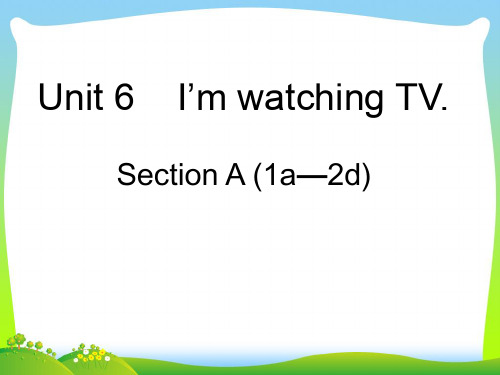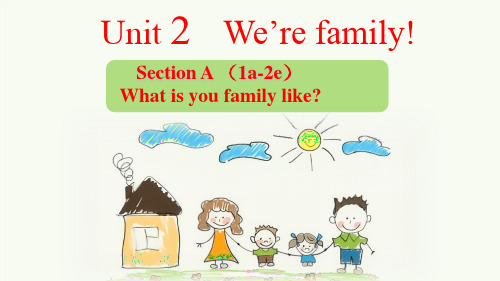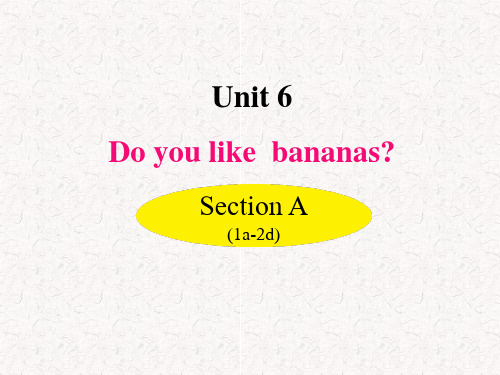人教版七年级英语上册unit6 Section A(1a--2d)课件
合集下载
人教版(2024)英语七年级上册Starter Unit3 SectionA(1a-2d)课件

goose( 复数形式)g_e_e_s_e__
It’s __a_c_a_t____. What is that? They are _r_a_b_b_i_ts___.
What are those?
What is this? It’s __a_g_o_o_s_e__. What are these? They are __d_u_c_k_s___.
We should love nature. Don’t waste food.
What’s Conversation 3 about?
1 Helen wants to know _h_o_w__m__a_n_y__apple trees and rabbits Mr. Fu has. 2 Mr. Fu has only two apple trees and _t_w_e__lv_e_rabbits, _e_i_g_h_t are white, _f_o_u_r_ and black .
Visit your grandparents in the countryside.
n. 乐趣;趣事 adj. 非常有趣的;充满欢乐的
• What’s fun at your grandparents’ home?
yard /ya:d/ 院子;庭院
Is there a big yard in your grandparents’ house?
What is that? What are those?
What is this? What are these?
1b Work in pairs, talk about the plants and animals you can see in the picture.
It’s __a_c_a_t____. What is that? They are _r_a_b_b_i_ts___.
What are those?
What is this? It’s __a_g_o_o_s_e__. What are these? They are __d_u_c_k_s___.
We should love nature. Don’t waste food.
What’s Conversation 3 about?
1 Helen wants to know _h_o_w__m__a_n_y__apple trees and rabbits Mr. Fu has. 2 Mr. Fu has only two apple trees and _t_w_e__lv_e_rabbits, _e_i_g_h_t are white, _f_o_u_r_ and black .
Visit your grandparents in the countryside.
n. 乐趣;趣事 adj. 非常有趣的;充满欢乐的
• What’s fun at your grandparents’ home?
yard /ya:d/ 院子;庭院
Is there a big yard in your grandparents’ house?
What is that? What are those?
What is this? What are these?
1b Work in pairs, talk about the plants and animals you can see in the picture.
新人教版七年级英语下册Unit6 Section A(1a—2d)优质课课件.ppt

▪ (3) 李雷的妈妈正在做汤。 ▪ Li Lei’s mother _____ _____soup. ▪ (4) 杰克正在玩电脑游戏。 ▪ Jack _____ _____ computer games. ▪ (5)三班的学生正在听CD。 ▪ The students of Class 3 _____ _____ to
What is she doing?
She is cleaning .
1a
Match the activities with the pictures.
1. watching TV ____ .
2. cleaning ___.
3. reading a
newspaper .
4. talking on the
_______.Do you want to ________ the movies? Jack: That sounds good.
▪ 2c Role-play the conversation in 2b.
2d Role-play the conversation.
▪ Jenny: Hello? This is Jenny. ▪ Laura: Hi, Jenny. It’s Laura here. ▪ Jenny: Oh, hi, Laura. What are you doing? ▪ Laura: Not much. I’m just washing my clothes. What
▪ (3) —Let’s _____ at the school gate. ▪ —That sounds good. ▪ (4)Where is your pen pal _____? ▪ (5) —What is Jane doing? ▪ —She is _____ TV.
人教版初中英语七年级上册Unit 6 Section A (1a-2d)-课件

A: Do you like bananas? B: Yes, I do.
A: Do you like salad? B: No, I don’t.
A: Do you like oranges? B: Yes, I.
2b Listen again. Fill in the blanks.
2c (Imagine you are having lunch with your friend.) Practice the conversations in 2b. Give answers
that are true for you.
2d Answer the questions below and then role-play the conversation.
Do you like bananas? 1 Yes, I do.
3
Do you like oranges? Yes, I do.
Practice
1c Practice the conversations above with your
partner. Then make you own conversations.
A: I like _h_a_m__b_u_r_g_e_rs__. Do you like _h_a_m_b_u_r_g_e_r_s____? B: Yes, I do. A: Do you like_t_o_m_a_t_o_e_s ? B: No, I don’t like___to_m__a_t_o_e_s___. A: Let’s have _ic_e_-_cr_e_a_m_. B: Oh, no. A: No? B: I don’t like _ic_e_-_cr_e_a_m___.
A: Do you like salad? B: No, I don’t.
A: Do you like oranges? B: Yes, I.
2b Listen again. Fill in the blanks.
2c (Imagine you are having lunch with your friend.) Practice the conversations in 2b. Give answers
that are true for you.
2d Answer the questions below and then role-play the conversation.
Do you like bananas? 1 Yes, I do.
3
Do you like oranges? Yes, I do.
Practice
1c Practice the conversations above with your
partner. Then make you own conversations.
A: I like _h_a_m__b_u_r_g_e_rs__. Do you like _h_a_m_b_u_r_g_e_r_s____? B: Yes, I do. A: Do you like_t_o_m_a_t_o_e_s ? B: No, I don’t like___to_m__a_t_o_e_s___. A: Let’s have _ic_e_-_cr_e_a_m_. B: Oh, no. A: No? B: I don’t like _ic_e_-_cr_e_a_m___.
Unit6SectionA2a2d课件人教版英语七年级上册

Exercises:
二.根据句意和首字母填单词: 1. Do you l_______ salad? 2.I want to eat (想吃)some b_________. 3. Many p______ are on the table. 4. My mother and father are my p__________. 5. Let’s play t________. 6. That s_______ good.
3. John likes burgers, salad, apples and __A__. A. strawberries B. pears C. banana
Read the dialogue in 2d. Then answer the questions.
Does John like hamburgers? Yes, he does.
hamburgers milk bananas strawberries pears
tomatoes bread salad
oranges ice-cream
bread
bread
A: Does he like bread? B: Yes, he does. He likes bread.
ice cream
fruit
tomatoes
oranges
strawberries
pears
bananas
food salad
bread
hamburgers
rice
milk ice-cream
a banana
an orange
bananas
oranges
a pear
pears
人教版初中英语七年级上册 UNIT 2 Section A 1a-2d(第1课时) 课件PPT

2022/9/19
8
1b Listen and circle the words you hear in 1a.
1. mother
2. father
3. parents
4. brothers
5. grandmother
6. grandfather
7. friend
8. grandparents
9. sister
2022/9/19
6
1c Read and role-play the conversation in 1a.
That’s my family. Those are my parents.
Who’s she?
She’s my sister. Oh, and these are my brothers.
A. he’s
B. she’s
C. that is
D. this is
4.—Have a good day, Wang Ping? —___A____
A. Thanks.
B. I’m fine.
C. OK.
D. Nice to meet you.
2022/9/19
25
Ⅱ.用括号中所给单词的的适当形式填空。 1. Lucy, Mary and Linda are my good _f_r_i_en__d_s (friend). 2. Are __th__o_se__ (that) your sisters? 3. They __a_r_e___ (be) my father and mother. 4. These __a_r_e___(be)are my grandparents. 5. Mr. Black has(有)three __b__ro_t_h_e_r_s (brother).
Unit 2 Section A(1a-2e)课件人教版2024新教材七年级上册英语

who is sb?询问人物的身份
Teng Fei: Is this your brother? Peter: No, it's my cousin, David. This is my brother, Jim.
cousin n. 表兄弟姐妹
Teng Fei: Who are they?
Peter:
Your family is where you feel safe and loved, and they teach you important things.
学习目标
Learning objectives objective n. 目标
In this unit, you will
identify v. 识别
兄; 弟
sister
姐; 妹
Presentation Let’s meet the family members.
grandpa
[ˈɡrænpɑː]
parents
grandparents
grandma
[ˈɡrænmɑː]
dad
[dæd]
son
/sʌn/
mom
[mɒm]
uncle
/'ʌŋkl/
daughter cousin
Ella: Niceto meet you too, Mr and Mrs Wang.
Yaming: And this is my sister, Yaqi.
Ella: Hi, Yaqi!
Yaqi: Hi, Ella!
Conversation 2 Teng Fei: Is this your family photo, Peter? Peter: Yes, it is. Teng Fei: Are these your parents? Peter: Yes, they are. Teng Fei: Who' s he? Peter: He's my father's brother, my uncle. And this is my aunt. Teng Fei: Who's she? Peter: She's my sister, Helen. Teng Fei: Is this your brother? Peter: No, it's my cousin, David. This is my brother, Jim. Teng Fei: Who are they? Peter: They're my grandparents. They're my father's parents. Teng Fei: What a happy family!
人教版七年级英语上册第六单元Section A (1a-2d)课件

1. hamburgers d 2. tomatoes i
3. oranges f 4. ice-cream h 5. salad b 6. bananas g
7. strawberries c 8. pears j
9. milk e 10. bread a
1b
Listen and number the conversations [1-3].
6. week n. 周;星期 Sunday is the first day of the week. 星期日是一周的第一天。 last week 上礼拜 this week 本周 next week 下周
7. think about 思考,思索
(一般是短时间的较仔细的考虑) What do you think about that? 你认为怎么样? I’ll have to think about it. 我得想一想。
以字母o结尾的有生命词,其 复数形式在词尾加-es。如图:
heroes
tomatoes
potatoes
[口诀] 英雄爱吃西红柿和马铃薯。
2. How about…? 相当于 What about…? 意 为 “……怎么样?”是一个用来征询别人 的 意见、向别人提建议的交际用语。about 是介词,后跟名词、代词或V-ing形式。 How about nine o’clock? 9点钟怎么样?
2d
Jack: Hey, John’s birthday dinner is next week. Let’s think about the food.
Tom: Sure. How about burgers, vegetable salad, and some fruit?
3. oranges f 4. ice-cream h 5. salad b 6. bananas g
7. strawberries c 8. pears j
9. milk e 10. bread a
1b
Listen and number the conversations [1-3].
6. week n. 周;星期 Sunday is the first day of the week. 星期日是一周的第一天。 last week 上礼拜 this week 本周 next week 下周
7. think about 思考,思索
(一般是短时间的较仔细的考虑) What do you think about that? 你认为怎么样? I’ll have to think about it. 我得想一想。
以字母o结尾的有生命词,其 复数形式在词尾加-es。如图:
heroes
tomatoes
potatoes
[口诀] 英雄爱吃西红柿和马铃薯。
2. How about…? 相当于 What about…? 意 为 “……怎么样?”是一个用来征询别人 的 意见、向别人提建议的交际用语。about 是介词,后跟名词、代词或V-ing形式。 How about nine o’clock? 9点钟怎么样?
2d
Jack: Hey, John’s birthday dinner is next week. Let’s think about the food.
Tom: Sure. How about burgers, vegetable salad, and some fruit?
Unit 6 Section A Grammar Focus-3c 课件 人教版英语七年级上册

Grammar Focus
Do you like salad?
Do they like pears? Does she like tomatoes? I like oranges. We like rice. He likes ice-cream.
Yes, I do./No, I don't.
Yes, they do./No, they don't. Yes, she does./No, she doesn't. I don't like bananas. We don't like hamburgers. He doesn't like vegetables.
Complete the chart!
Food
Likes Doesn’t like
Ⅰ. 用所给单词的适当形式填空。
1. I like __t_o_m__a_to_e_s___(tomato) very much. 2. Nick ____l_ik_e_s_____(like) hamburgers and salad. 3. Let’s ___t_h_i_n_k_____(think) about the birthday dinner. 4. Ms. Smith has ten _s_t_r_a_w_b_e_r_r_ie_s_(strawberry)? 5. Hamburgers? That ___s_o_u_n_d_s____(sound) good. 6. My brother __d_o_e_s_n_’t_l_i_k_e_(not like) eggs. 7. His cousins ___d_o_n_’t__li_k_e__(not like) ice-cream.
- 1、下载文档前请自行甄别文档内容的完整性,平台不提供额外的编辑、内容补充、找答案等附加服务。
- 2、"仅部分预览"的文档,不可在线预览部分如存在完整性等问题,可反馈申请退款(可完整预览的文档不适用该条件!)。
- 3、如文档侵犯您的权益,请联系客服反馈,我们会尽快为您处理(人工客服工作时间:9:00-18:30)。
•hamburgers d •tomatoes i •oranges f •ice-cream h •salad b •bananas g •strawberries c •pears j •milk e • bread a
1b Listen and number the conversations [1-3].
Jack: Yes, you’re right. What about the fruit? Tom: I think John likes strawberries and
apples. Bill: OK. Let’s have strawberries and apples then.
Complete the conversation.
由上句“吃点面条和饺子
—_______________不_客. 气。 怎么样?”可知这是建议。
A.You're welcome没关系。
B. That’s all right 你真是太好了。 C. That's nice of you听起来不错。 D. That sounds good
Thank you
4. Let’s have strawberries and apples then. “Let’s have…”译为“让我们吃……” 1) 在英语中“have”+表示一日三餐的名词,意为 “用餐”。
have breakfast/lunch/supper 吃早饭/午饭/晚饭 have dinner 吃晚饭
3. — Let’s __ha_v_e_ salad. — Oh, no. I __do_n_’t__ __l_ik_e__ salad.
4. — Let’s _ha_v_e __ _i_ce_-_cr_ea_m___ and _h_am__bu_r_ge_rs____. — That _s_o_un_d_s__ good. I _li_ke__ them.
I like bread,but I don’t like milk.
I have a good friend. She likes pears, but she doesn’t like oranges.
Challenge yourselves
My name is ________.
I like
— What’s that?
— It’s _____.
milk
bread
salad
an ice-cream
— What are those? — They are _________.
bananas
tomatoes
oranges
strawberries pears hamburgers
Countable Nouns(可数名词)
oranges
pears
tomatoes
Tip:表示名词的种类,可数名词用复rgers strawberries
Uncountable Nouns(不可数名词)
Tip:表示名词的种类,不可数名词不作变化!
milk
bread
salad
ice-cream
1a Match the words with the things in the picture.
partner. Then make your own conversations.
DDooyyoouulliikkeesobaralaanndag?neass??
NYeos,,IIddoon.’t.
I like I don’t like
2a Listen and circle the food you hear.
next year 明年
last year 去年
2. Let’s think about the food. 让我们来想想(吃什么)食物吧。
“think about”表示“思考;考虑”, “think” 为不及物动词,常与介词 about连用。例如: Let me think about your house. 让我考虑考虑你的房子问题。
3. How about...?意为“……怎么样?” 相当于What about...?,用来询问情况或征求意见。 如:How about/What about eating salad?
吃沙拉怎么样?
My father is a teacher. What about yours? 我的父亲是位老师,你父亲呢?
They are very beautiful. 4. I have much _h_o_m__e_w_o_r_k__(homework) to do.
➢ 中考链接
— It's nearly lunch time. How about
having some noodles and
dumplings?
Language points
1. John’s birth day dinner is next week.
“next week” 译为“下周”,英语中的 “next”,
“last” 后跟表示时间的词语构成时间状语,如:
next day 第二天 last month 上个月
next month 下个月 last week 上周
II. 根据图片提示完成句子。
1. — _D_o_ you like __s_tr_a_w_be_r_ri_es__? — Yes, I do. I like _ba_n_a_na_s___, too.
2. — _D_o_es__ your father like __pe_a_rs__? — No. He _d_o_es_n_’t__ like _p_e_ar_s__.
hamburgers pears tomatoes strawberries
oranges
ice cream salad bananas
2b Listen again. Fill in the blanks.
tomatoes
ice cream ice cream
tomatoes
2c Practice the conversations above.
人教版七年级上册
Unit6 Do you like bananas?
Section A( 1a-2d )
1.能掌握以下单词 banana, hamburger, tomato, ice-cream, salad, strawberry等。 2.能掌握以下句型: ① — Do you like salad? — Yes, I do. / No, I don’t. ② — Does she/he like …? — Yes, she/he does./ No, she/he doesn’t. 3.能通过介绍食物学会询问对方喜欢与 不喜欢的食物。
, but I don’t like
.
I have a good friend. His/Her name is _____. He/She likes ______, but he/she doesn’t like _____.
Jack: Hey, John’s birthday dinner is next week. Let’s think about the food. Tom: Sure. How about burgers,
2)have+表示食品、饮料等的名词, 意为“吃;喝” (=eat, drink)。如: have (some) bread 吃面包 have eggs (for breakfast) (早餐)吃鸡蛋 have (a cup of )tea 喝(一杯)茶
Exercises
1. 第二天 next day 2. 明年 next year 3. last week 上周 4. 上个月 last month 5. have breakfast 吃早餐 6. 怎么样 how about/what about 7. 考虑 think about
III. 用所给词的适当形式填空。
1. Don’t take the fruit to Alice. I need __it____ (it). 2. T__h_o_s_e (That) are my __fr_i_e_n_d_s_ (friend). _T_h_e_y__
(It) are nice. 3. There are some p_h__o_to_s_ (photo) on the wall.
2 A: Do you like salad?
B: No, I don’t.
1 A: Do you like bananas?
B: Yes, I do.
3 A: Do you like oranges?
B: Yes, I do.
1c Practice the conversations above with your
I like _i_ce_-_c_r_e_am___. Do you likeit_____? Yes, I _d_o__.D_o_e_s__ Sallylik_e__it______? No, she doesn't. Let's _ha_v_e__an__ic_e_-_c_re_a_m___. That _s_o_u_nd_s__ good.
vegetable salad, and some fruit? Bill: Sounds good. John likes hamburgers.
Jack: Oh, I don’t like salad. Bill: But John likes salad, and it’s his birthday.
1b Listen and number the conversations [1-3].
Jack: Yes, you’re right. What about the fruit? Tom: I think John likes strawberries and
apples. Bill: OK. Let’s have strawberries and apples then.
Complete the conversation.
由上句“吃点面条和饺子
—_______________不_客. 气。 怎么样?”可知这是建议。
A.You're welcome没关系。
B. That’s all right 你真是太好了。 C. That's nice of you听起来不错。 D. That sounds good
Thank you
4. Let’s have strawberries and apples then. “Let’s have…”译为“让我们吃……” 1) 在英语中“have”+表示一日三餐的名词,意为 “用餐”。
have breakfast/lunch/supper 吃早饭/午饭/晚饭 have dinner 吃晚饭
3. — Let’s __ha_v_e_ salad. — Oh, no. I __do_n_’t__ __l_ik_e__ salad.
4. — Let’s _ha_v_e __ _i_ce_-_cr_ea_m___ and _h_am__bu_r_ge_rs____. — That _s_o_un_d_s__ good. I _li_ke__ them.
I like bread,but I don’t like milk.
I have a good friend. She likes pears, but she doesn’t like oranges.
Challenge yourselves
My name is ________.
I like
— What’s that?
— It’s _____.
milk
bread
salad
an ice-cream
— What are those? — They are _________.
bananas
tomatoes
oranges
strawberries pears hamburgers
Countable Nouns(可数名词)
oranges
pears
tomatoes
Tip:表示名词的种类,可数名词用复rgers strawberries
Uncountable Nouns(不可数名词)
Tip:表示名词的种类,不可数名词不作变化!
milk
bread
salad
ice-cream
1a Match the words with the things in the picture.
partner. Then make your own conversations.
DDooyyoouulliikkeesobaralaanndag?neass??
NYeos,,IIddoon.’t.
I like I don’t like
2a Listen and circle the food you hear.
next year 明年
last year 去年
2. Let’s think about the food. 让我们来想想(吃什么)食物吧。
“think about”表示“思考;考虑”, “think” 为不及物动词,常与介词 about连用。例如: Let me think about your house. 让我考虑考虑你的房子问题。
3. How about...?意为“……怎么样?” 相当于What about...?,用来询问情况或征求意见。 如:How about/What about eating salad?
吃沙拉怎么样?
My father is a teacher. What about yours? 我的父亲是位老师,你父亲呢?
They are very beautiful. 4. I have much _h_o_m__e_w_o_r_k__(homework) to do.
➢ 中考链接
— It's nearly lunch time. How about
having some noodles and
dumplings?
Language points
1. John’s birth day dinner is next week.
“next week” 译为“下周”,英语中的 “next”,
“last” 后跟表示时间的词语构成时间状语,如:
next day 第二天 last month 上个月
next month 下个月 last week 上周
II. 根据图片提示完成句子。
1. — _D_o_ you like __s_tr_a_w_be_r_ri_es__? — Yes, I do. I like _ba_n_a_na_s___, too.
2. — _D_o_es__ your father like __pe_a_rs__? — No. He _d_o_es_n_’t__ like _p_e_ar_s__.
hamburgers pears tomatoes strawberries
oranges
ice cream salad bananas
2b Listen again. Fill in the blanks.
tomatoes
ice cream ice cream
tomatoes
2c Practice the conversations above.
人教版七年级上册
Unit6 Do you like bananas?
Section A( 1a-2d )
1.能掌握以下单词 banana, hamburger, tomato, ice-cream, salad, strawberry等。 2.能掌握以下句型: ① — Do you like salad? — Yes, I do. / No, I don’t. ② — Does she/he like …? — Yes, she/he does./ No, she/he doesn’t. 3.能通过介绍食物学会询问对方喜欢与 不喜欢的食物。
, but I don’t like
.
I have a good friend. His/Her name is _____. He/She likes ______, but he/she doesn’t like _____.
Jack: Hey, John’s birthday dinner is next week. Let’s think about the food. Tom: Sure. How about burgers,
2)have+表示食品、饮料等的名词, 意为“吃;喝” (=eat, drink)。如: have (some) bread 吃面包 have eggs (for breakfast) (早餐)吃鸡蛋 have (a cup of )tea 喝(一杯)茶
Exercises
1. 第二天 next day 2. 明年 next year 3. last week 上周 4. 上个月 last month 5. have breakfast 吃早餐 6. 怎么样 how about/what about 7. 考虑 think about
III. 用所给词的适当形式填空。
1. Don’t take the fruit to Alice. I need __it____ (it). 2. T__h_o_s_e (That) are my __fr_i_e_n_d_s_ (friend). _T_h_e_y__
(It) are nice. 3. There are some p_h__o_to_s_ (photo) on the wall.
2 A: Do you like salad?
B: No, I don’t.
1 A: Do you like bananas?
B: Yes, I do.
3 A: Do you like oranges?
B: Yes, I do.
1c Practice the conversations above with your
I like _i_ce_-_c_r_e_am___. Do you likeit_____? Yes, I _d_o__.D_o_e_s__ Sallylik_e__it______? No, she doesn't. Let's _ha_v_e__an__ic_e_-_c_re_a_m___. That _s_o_u_nd_s__ good.
vegetable salad, and some fruit? Bill: Sounds good. John likes hamburgers.
Jack: Oh, I don’t like salad. Bill: But John likes salad, and it’s his birthday.
